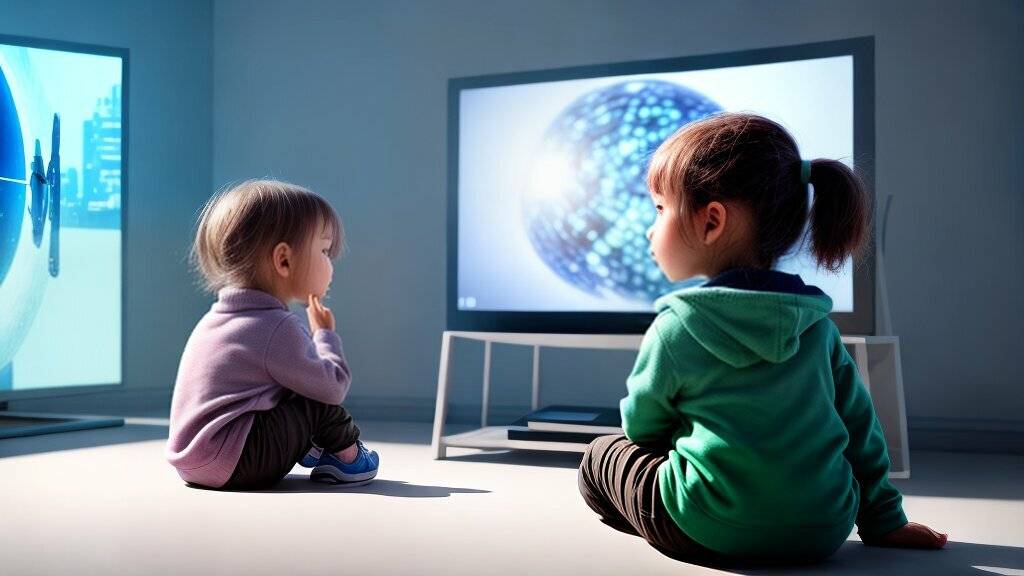Key Takeaways
- Excessive screen time can negatively impact a child’s cognitive, social, emotional, and physical development.
- Risks associated with excessive screen time include decreased attention span, poor academic performance, delayed language development, obesity, and sleep disturbances.
- Prolonged screen use may also lead to aggression, irritability, and decreased social skills.
- Excessive screen time can contribute to anxiety, depression, and poor self-esteem, affecting a child’s mental health and well-being.
- Parents should follow recommended screen time guidelines and establish healthy screen habits to promote balanced development in their children.
Understanding the Risks of Excessive Online Exposure
As technology continues to evolve, children spend more time than ever in front of screens. While some screen time can have educational benefits, excessive screen use can negatively affect a child’s development, health, and behavior. Decreased attention span and poor academic performance: Research has shown that too much screen time can lead to decreased attention span and poor academic performance. This is especially true for young children whose brains are still developing. Screen time can interfere with developing cognitive skills such as memory, attention, and language. Delayed language development: Prolonged screen use can also delay language development in young children. Children who spend more time in front of screens often have fewer opportunities to engage in face-to-face communication and language-rich activities, impacting their language acquisition. Physical health risks: Excessive screen time is also linked to various physical health risks, including obesity, poor posture, and eye strain. Children who spend more time in front of screens are also at risk of sleep disturbances, which can further impact their health and well-being.
Aggression, irritability, and decreased social skills: Besides the physical risks, excessive screen time can also impact a child’s behavior. Research has suggested prolonged screen use can contribute to aggression, irritability, and decreased social skills. By understanding the risks of excessive screen time, parents can take proactive steps to promote healthy screen habits and limit their child’s screen exposure.
The Role of Video Games and Online Content
Video games and online content are two areas where excessive screen time may negatively impact behavior. Many modern video games are designed to be addictive and can lead to aggressive behavior and poor impulse control. Similarly, online content can expose children to inappropriate material and behaviors that may not align with their values. As a parent, monitoring your child’s exposure to video games and online content is essential. Consider limiting the time spent on these activities and ensure their content aligns with your family’s values.The Importance of Alternative Activities
One way to mitigate the impact of excessive screen time on behavior is to encourage alternative activities. Children who spend too much time in front of screens may have more difficulty developing hobbies and interests. Encourage your child to pursue various interests, such as sports, reading, and creative play. You can help them develop social skills, explore their interests, and reduce their reliance on screens by providing various options.
- Limit the amount of time your child spends in front of a screen
- Monitor their exposure to video games and online content
- Encourage alternative activities and hobbies
Understanding the Effects on a Child’s Mental Well-being
Excessive time online impacts not only a child’s physical health but also their mental well-being. Studies have shown that over-exposure to screens can contribute to anxiety, depression, and poor self-esteem. The effects on mental health can be even more pronounced for children who spend large amounts of time on social media. Cyberbullying, online harassment, and exposure to harmful content can all harm a child’s mental health, leading to feelings of isolation and anxiety. Furthermore, too much screen time may interfere with a child’s ability to form healthy relationships. Children with excessive screen time may struggle with face-to-face communication and empathizing with others.It is clear that excessive screen time can have a significant impact on a child’s mental well-being. Parents can help safeguard their child’s mental health and well-being by promoting healthy screen habits.

Finding the Right Balance: Recommended Screen Time Guidelines
As discussed, excessive screen time can adversely affect a child’s development, behavior, and mental health. That being said, screens are an integral part of modern life, and they can offer educational and entertainment opportunities when used responsibly.So, what is the recommended screen time for kids? The American Academy of Pediatrics recommends the following guidelines:
- For children under 18 months: Avoid screen time, except for video chatting.
- For children aged 18-24 months: Introduce high-quality media with a parent or caregiver, and limit screen time to no more than 1 hour per day.
- For children aged 2-5 years: Limit screen time to an hour per day of high-quality programming, and watch it together with your child to help them understand what they are seeing.
- For children 6 years and older: Establish a set limit on the time spent using media and ensure that it doesn’t interfere with sleep, physical activity, and other healthy behaviors. The Academy recommends prioritizing non-screen activities such as reading, playing outside, and enjoying time with family and friends.

Setting Limits: Importance of Limiting Screen Time
As we’ve seen, excessive screen time can harm a child’s health, development, and behavior. Parents need to prioritize their children’s overall well-being by setting limits on screen time and promoting healthy habits.Creating Screen-Free Zones: One effective strategy is establishing designated screen-free zones in the home, such as the dinner table, bedrooms, and certain times of the day. This encourages children to engage in alternative activities and promotes quality family time.
Encouraging Alternative Activities: Along with screen-free zones, parents should encourage alternative activities that promote physical activity, social interaction, and creativity. This can include outdoor play, board games, or art projects.
Modeling Responsible Device Use: Parents should lead by example and model responsible device use. This includes setting limits on their screen time, avoiding using devices while driving or during family time, and monitoring their content consumption.
By implementing these strategies, parents can help mitigate the harms of excessive screen time and promote a healthy and balanced relationship with screens for their children.

Remembering that screen time is just one component of a child’s overall development is crucial. Parents can help their children develop into well-rounded individuals with strong cognitive, social, and emotional skills by prioritizing a healthy balance of screen time and other activities.
Mitigating the Harmful Effects: Strategies for Parents
As a parent, taking active steps to mitigate the harmful effects of excessive screen use on your child’s health is absolutely necessary. Here are some practical strategies that you can implement:Monitor Screen Content
Keepin track of the media your child is exposed to. Ensure that it is age-appropriate and aligns with your family values. Encourage your child to engage in educational content, such as reading apps or educational games.Encourage Physical Activity
Regular physical activity is crucial for a child’s overall health and well-being. Encourage outdoor play and other physical activities, such as sports or dance classes. Set aside time each day for physical play and make it a family activity.Promote Healthy Sleep Habits
Screen time can disrupt a child’s sleep patterns, leading to sleep disturbances and fatigue. Encourage your child to wind down before bed with calming activities such as reading or storytelling. Additionally, establish a screen-free zone in your child’s bedroom and limit screen time before bedtime.Set an Example
Children learn by example, so modeling responsible screen habits is vital. Limit your own screen time in front of your child and engage in alternative activities such as reading or spending time outdoors.
By implementing these strategies, parents can help their children develop a healthy relationship with screens. Remember, the key is to find a balance that works for your family and be proactive in setting limits and fostering responsible screen habits in your children.
Conclusion
As parents, we must understand the potential risks of excessive screen time on our children’s development, behavior, and mental well-being. Too much screen exposure can impact a child’s overall health and well-being, from decreased attention span to delayed language development. However, it’s not all doom and gloom. By implementing practical strategies such as creating screen-free zones, encouraging physical activity, and promoting healthy sleep habits, we can help mitigate the harmful effects of excessive screen use. Finding a healthy balance between screen time and other activities is essential for our children’s development, health, and well-being.Empowering Children with Responsible Screen Habits
It’s also crucial for parents to model responsible device use and encourage quality screen time over quantity. By monitoring content and engaging in educational screen time, we can help our children develop a healthy relationship with screens. It’s important to remember that setting limits on screen time isn’t about depriving our children of technology. Instead, it’s about empowering them with responsible screen habits that will serve them well for the rest of their lives. As we navigate this ever-evolving digital landscape, let’s remain proactive in setting limits and fostering responsible screen habits in our children. By doing so, we can help them develop into healthy, balanced individuals who can thrive both on and off-screen.Frequently asked Questions
Excessive screen time can adversely affect a child’s cognitive, social, and emotional development.
Too much screen time can lead to decreased attention span, poor academic performance, delayed language development, obesity, and sleep disturbances.
Prolonged screen use can be linked to aggression, irritability, and decreased social skills.
Excessive screen time can contribute to anxiety, depression, and poor self-esteem.
Excessive screen time may affect brain development, cognitive abilities, and social relationships later in life.
Limiting screen time is crucial for children’s overall well-being and can help prevent harmful effects on their health and development.
- For children under 18 months: Avoid screen time, except for video chatting.
- For children aged 18-24 months: Introduce high-quality media with a parent or caregiver, and limit screen time to no more than 1 hour per day.
- For children aged 2-5 years: Limit screen time to an hour per day of high-quality programming, and watch it together with your child to help them understand what they are seeing.
- For children 6 years and older: Establish a set limit on the time spent using media and ensure that it doesn’t interfere with sleep, physical activity, and other healthy behaviors. The Academy recommends prioritizing non-screen activities such as reading, playing outside, and enjoying time with family and friends.
Parents can monitor content, encourage physical activity, and promote healthy sleep habits to mitigate the harmful effects of excessive screen use.
A healthy balance between screen time and other activities is crucial for a child’s overall development, health, and well-being.

